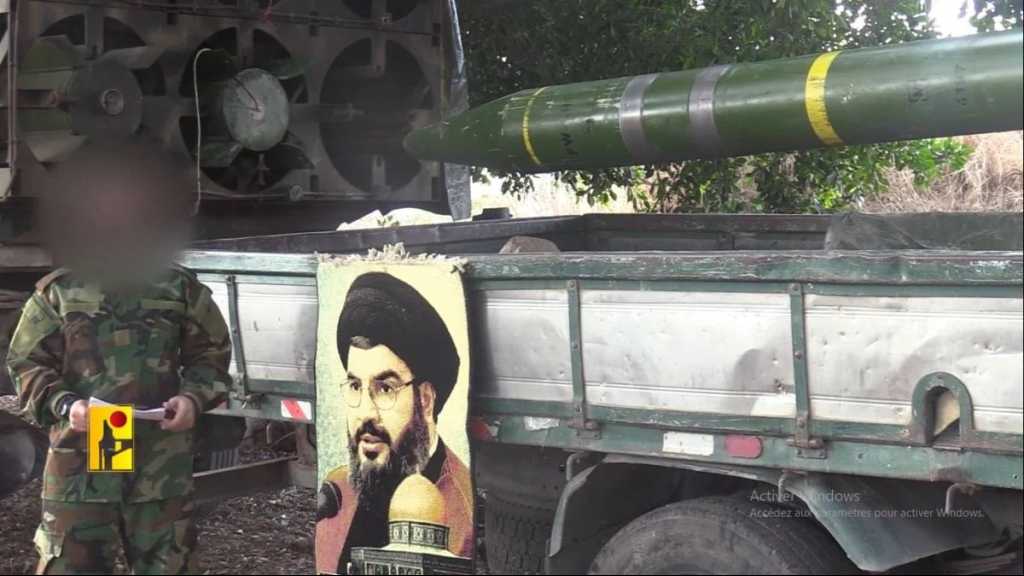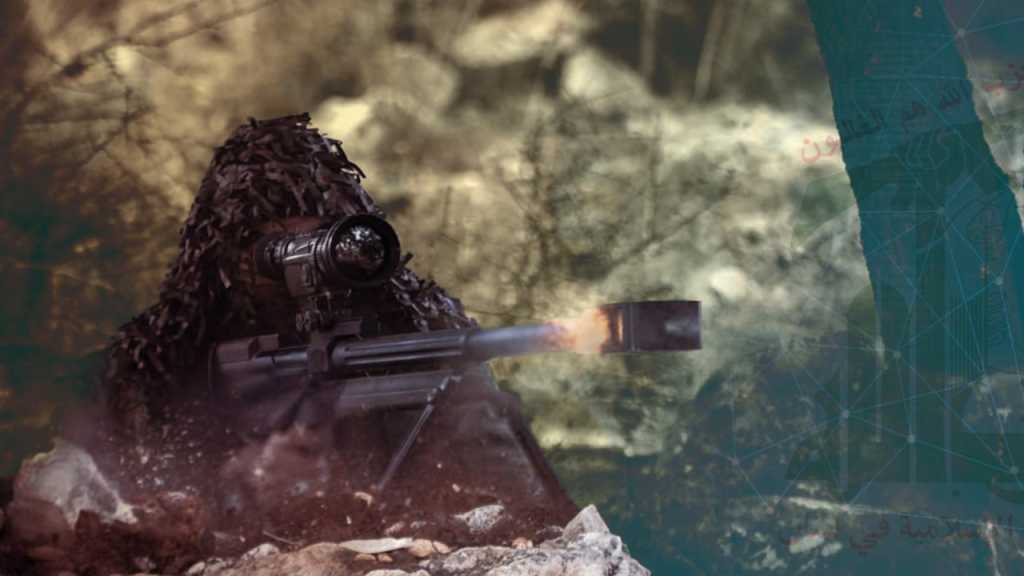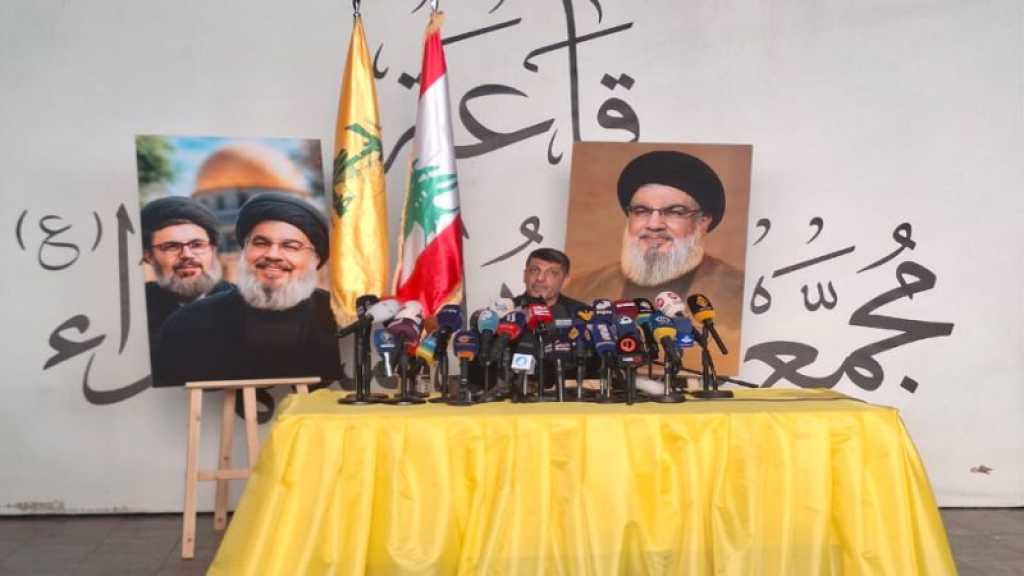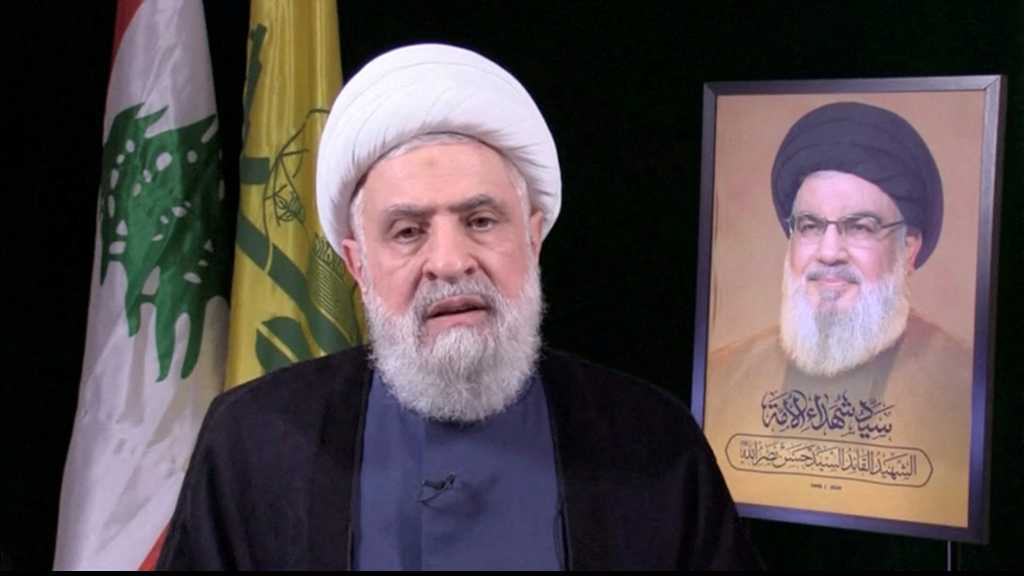
Sayyed Nasrallah’s Full Speech on January 19, 2018
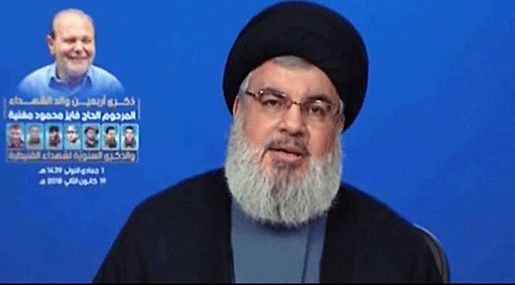
Local Editor
Peace be upon you,
To the spirit of the dear and beloved father, Hajj Abu Imad, to the dear and distinguished martyrs in Quneitra, and to all martyrs, we dedicate the reward of [reciting] Al-Fatihah.
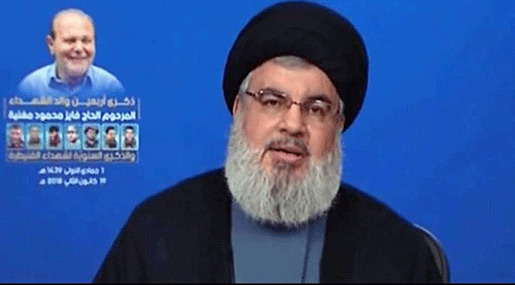
I seek refuge in Allah from the accursed Satan. In the name of Allah the Most Gracious the Merciful. Praise be to Allah, Lord of the Worlds, and prayers and peace be upon our master and Prophet, the Seal of the Prophets Abi Al-Qasim Muhammad Bin Abdullah, and his good and pure family and all his good and chosen companions and all the prophets and messengers. Peace and God's mercy and blessings be upon you all.
Allah says in his glorious book, In the name of God the Most Gracious the Most Merciful: "And if you are killed in the cause of Allah or die - then forgiveness from Allah and mercy are better than whatever they accumulate [in this world]. And whether you die or are killed, unto Allah you will be gathered. Allah Most Great has spoken the truth."
To begin with, I welcome all of you to this blessed and fine gathering in reviving the memory of these dear, beloved and distinguished people. I also restate my condolences to the family of the great deceased, Hajj Abu Imad, to his kind wife, the great mother Hajjeh Um Imad, to all his family, his daughters, his grandchildren, his brothers, his kinsmen, his relatives, to everyone. I ask Allah Almighty to place him with the Messenger of Allah, his pure household, his good companions and all the martyrs and the righteous ones. I would also like to restate my congratulations and condolences to the families of our dear and distinguished martyrs who have passed during days similar to these [in previous years] in Syria's Quneitra region. They have been martyred by the brutal and continuous "Israeli" aggression against the resistance, Syria, Lebanon, Palestine and the entire region. I am honored to mention their honorable names: Martyr leader Hajj Abu Isa, Mohammad Ahmad Isa, Martyr Mujahid Juihad Imad Moghniye, Martyr Mujahid mohammad ali Hassan Abolhassan, Martyr Mujahid Abbas Ibrahim Hijazi, Martyr Mujahid Ali Hassan Ibrahim, Martyr Mujahid Ghazi Ali Dawi, and a dear brother in the Islamic Revolutionary Guard Corps in Iran Martyr Brigadier General Muhammad Ali Abdullah Dadi, known among us as Haj Abu Ali Rida. I ask Allah Almighty to sheath them all with His mercy and accept them among the martyrs.
Brothers and sisters, we must always honor the martyrs and the families of the martyrs at the beginning of a ceremony like this. [We should] recognize the great grace that these martyrs bestow on our country, our people, our region and our nation. Today, when any official in Lebanon talks about security, everyone must be aware that this security would not have been possible without the sacrifices of these martyrs. When we talk today in the region about a major defeat for the American Zionist project, in more than one country and in more than one arena, [when we talk] about victories of governments and peoples in facing challenges, and when we want to count the factors and the reasons, of course, there is no single factor. The first credit is to Allah Almighty, who helped, triumphed, supported and guided the aim. After God Almighty being in the first place, we must put this group, which includes the sacrificing martyrs who gave their blood, the families of the martyrs who were tolerant and patient, the wounded, especially those who still suffer from the wounds and their effects, and the fighters, officers, soldiers a well as the resistance fighters in more than one country and in more than arena who are still filling the battlefields.
First and foremost, it is thanks to those [men] with their steadfastness, sacrifices, persistence, and blood. There is a land that was liberated, prisoners who have returned, security that has been achieved, victory that has been declared, or a defeat of a hostile project. We must never forget this for a moment. We must know this great segment of our people, our people in Lebanon, in Palestine, in Syria, in Iraq, in Iran, in Yemen, in Bahrain, in every country, in every state, and in every place where there is a confrontation, defiance and a battle of this kind.
Allow me to say in this speech on this occasion: I have divided my address into three sections. In the first section, I start from Hajj Abu Imad, may Allah have mercy on him, and move to some of the headlines. I will talk about Abu Imad and his generation and our responsibility as well. In the second section, [I will talk about] some points related to the Lebanese affairs. I will conclude with a speech regarding the situation in the region.
Abu Emad, as we all know him, was a father, a parent, a believer, religious, kind, humble, immaculate, and a compassionate man. We know all these qualities. All those who were close to Abu Imad know these qualities: the patient, the calculating, the tormented, and the tested, especially in the last years. In any case, Hajj Abu Imad and Hajjeh Um Imad spent the rest of their lives supporting this path and backing it, attending all the occasions that needed hearts, feet and presence to be instilled among the families of the martyrs. We have had a large number of martyrs during these last years due to the major confrontation in the region.
The main quality of Hajj Abu Imad was also mentioned in the report just a little while ago; on the day we spoke about the martyrdom of Hajj Imad may God have mercy on him. Today we are talking about the father of a martyr, the father of martyrs, the mother of martyrs, and the family of martyrs. They have a quality that is somehow not yet present in any other family, which is that it [this family] has offered all its children as martyrs, all its sons as martyrs. We have honorable and dear families that have given three martyrs, four martyrs, two martyrs, but in these houses, the family still has young men who are sons. But in Hajj Fayez Moghniye's family, the men and young men are all martyrs. Glory be to Allah, it is also gradual from the youngest to the eldest, form martyr Jihad Fayez Moghniye to martyr Fouad Fayez Moghniye to martyr Hajj Imad Fayez Moghniye, may Allah be pleased with them all.
This is an important and exceptional merit. It reflects the level of giving, quality, testing and the level of ordeal, as well as the level of patience, submission and acceptance of God's will and choice, which we have seen from Abu Imad, Um Imad and all the members of this honorable family.
In spaking of Abu Imad and his generation, I, in fact, chose several quick titles. I will talk about them for the sake of our generation, our children and grandchildren. They are the generation before of our generation. Abu Imad is like my father, like the father of many of our age. Practically at the present moment, we can talk about our children. This is a generation. Our generation, the children of the fifties and close to the sixties, and our children and grandchildren.
We are talking about this generation that preceded us a little bit; The generation of the hard-working people. We mention - during that stage - which we lived as kids or what our children talk about the stage that our fathers and grandfathers experienced, the generation of Abu Imad and those who preceded him, and the generation of the fathers of this generation, the poverty, hunger, deprivation, neglect of the state and successive governments, and oppression.
In fact, any person who reads books or memoirs and hears about that stage will cry. He will not be able to bear when he hears about how these people lived and migrated from their villages, especially from the Bekaa, the south and the rest of the governorates to Beirut, to the suburbs of Beirut, to what His Eminence the Vanished Imam Sayyed Musa al-Sadr, may God bring him and his brothers back safe, called the belt of misery [hizam al bu's], starting from the Ouzai and Hay el-Sellom reaching the Karantina, Nabaa, Bourj Hammoud and Tel Zaatar and others.
And how they came from these villages and the countryside, what they did here, how they strived, how they worked night and day, the type of work they endured doing and continued like that. That is the generation of the parents. We remember how they used to work. I know entire families where the mother and the father worked from morning to evening so they can feed their children, enroll them in schools, or to take them to the doctor. They have always struggled to live and bore the hardship of life so that they can provide a reasonable life for their children, their daughters and sons. I am not saying a complete, luxurious life but a reasonable life with the minimum capabilities for endurance, survival and continuity; A life with dignity.
Those - according to our hadiths and existing accounts as Muslims, in our accounts, the one who works hard for his family, leaves early in the morning and returns late, get tired, he might work all day long and sometimes at night for the sake of his family, their lives, livelihood, and dignity - are like the mujahidine on the path of God. In one account, he is like a Mujahid on God's path.
This is normal. This is what we need. It is not acceptable for the fronts to be free of the Mujahideen because everything will fall in the hands of our enemies. Also, it is not acceptable for the community to be free of hard worker. If society turns into parents that cannot take responsibility or to lazy people, poverty, looting, theft, problems and crime will spread. So, they have bore great responsibilities.
Abu Imad, may God have mercy on him, was a model for those who worked hard in their lives, were tired and worked hard. These are details. After all, the people who lived with him know him.
Second, this generation was a generation of educators, an educator for its sons and daughters. The mothers and fathers of that generation - in reality - raised us, cared for us, talked to their children, advised their children, and preached to their children. Our generation, if it remained holding on to its values, morals, religion, Islam, beautiful and kind traditions and customs in our society, is due to the blessings of that generation with mothers and fathers raising us. They get the credit after God all mighty.
Why do I mention this point? To tell the present generations of mothers and father, from our generation, also our children and grandchildren that when they if they get married, they have to know that they have very important responsibilities.
Sadly in the contemporary reality, these responsibilities are being abandoned today. Where are the father and mother? Are they sitting with their children? Talking to their children? Even if they meet at lunch, dinner or an evening you will find everyone carrying this board and sitting. No one is talking to the other. No one is advising the other. Later, people will become strangers, even inside the house.
In the time of the Internet, the time Watsapp, in the time of these terms that I don't memorize, and at the time of the revolution of communication, where are the families, family relationships, social relationships and spiritual relationships?
The children are living in a different world. God knows who is raising them. God knows who is talking to them. God knows who is forming their convictions, cultures, values, customs and traditions. There comes a time - and do not be surprised - this generation and the two coming generations will resist, but in the future we will see generations cut off from all this, the past, history, and all these values, if fathers and mothers in each generation do not take their responsibilities seriously.
The third title is to keeping up with this resistance by this generation of parents. When we talk about the 70s and 80s, our fathers and mothers were still young, and those who enrolled in this resistance, most of them were young, 19, 20 and 21, and 22 years of age. This generation of parents, Abu Imad's generation opened the doors. We can say that they were two parts:
One part encouraged this direction, and there is another part that at least did not prevent or preserve their children and youth and did not stint favor them over Lebanon, the land, family, dignity, sovereignty and glory.
This quality, Alhamdulillah [Praise Be to Allah], as we criticized a little while ago, is still in our generation and in the generation of our children. This is clearly seen today in our society, but this always needs to be fixed and confirmed.
When Hajj Abu Imad gave one martyr, he could have stopped there. Instead of one martyr, there were two reaching to Hajj Imad, the leader of this path. This is one of the blessings of this extraordinary family. It gave Lebanon, the resistance, Palestine, and the resistance movement a figure, a man and a leader as Imad Moghniye, who was indeed an exceptional man, leader and figure.
It was not only the children. One of the grandchildren was also a martyr. You know that usually the grandfather's emotional relationship with the grandchildren become larger when his son dies. In this sense, Hajj Fayez Moghniye also gave a martyr from his grandchildren.
The last title in this first part is related to Hajj Abu Imad. It is the burial will. One of you might ask ‘how is this related'. I will tell you where I want to go with this.
When Hajj Abu Emad passed away, there was communication. His family naturally wanted him to be buried in Rawdat Al-Shahidain [cemetery] alongside his martyred sons. So the family would be close. It will visit the martyrs and the father of the martyrs.
But Hajj Abu Imad's request which he told to more than one person is that he wanted to be buried in his village, Tayr Debba, in the south. Well, why Hajj? I want to stop at this point, why?
(His answer For the family, my family, my children, my grandchildren, my daughters - he no longer has sons - and my grandchildren continue to go to the village. As he was a school in his life, he was a school in his death.
I want to stand a little bit at this point to say: Yes, also from the dangers of the Internet generation, the generation of the Watsapp , etc .. is the abandonment of these roots, towns and villages to which our fathers and grandfathers belong. He wanted this emotional relationship with the village to continue. Why do you find this more important to parents who came from villages to Beirut? Our generation and the generation of our children and grandchildren are mostly born in the suburbs. They are born far from the villages and towns. As for the parents' generation, these villages mean a lot to them (their parents and grandparents) and all this history.
And they want us to stay connected. The right thing is to remain connected. So, I urge that Hajj Abu Imad's will be a cultural and emotional will. That is, for us to work to make our generation connected to its villages and towns. Of course, this is the responsibility of the mothers and fathers of the current generations. There are some good customs in Lebanon. These customs must be maintained, although at times they retract. For example, on Saturdays, Sundays and during holidays, many people go up to the villages. These customs must be adhered to and also during the summer (these customs must be adhered to). I call for more than that. Any family in Beirut and in the suburbs that left their villages and towns should seek in any form - I know that the financial means do not help - to build a room in the village to remind them of their parents, fathers, mothers, and grandmothers. So that this house remains - Jeha's nail as it is said - for families to take turn and be there. This link must continue. But this in the cultural, sentimental and emotional dimension.
But allow me to expand further and to say a short word because this subject requires discussion. Perhaps this is an inclination for us to reconsider this accumulation of population in Beirut and its suburbs. There should be plans at the state level and at the level of civil society and NGOs. This can be a solution to the problems that exist today in this country. We have traffic crises that have no solution. If we wanted solutions, then we want enormous potential. We have severe ecological crises, there is the waste issue, health conditions issue, the social effects of this population accumulation, and the rapid spread of drugs, vice, and crimes. There are a lot of negative effects of this accumulation of population in narrow and closed areas. But if we return to the villages and do rural life again, of course all this requires plans and development and more importantly the state and civil society should help create jobs in the villages.
Secondly, providing transportation. I know that there are many families who have returned to their villages when highways were built. For example, sometimes a person might come from Nabatiyeh or Zahrani area and arrive in Beirut before a resident of Hay el-Sellom who is heading to Beirut. There are cases of this kind. This issue should be thought of, planned and studied. Even at our level. One day, we were sitting and thinking that most of our brothers who work in the south should live in the south and most of the brothers who work in the Bekaa should live in the Bekaa.
And so on in the rest of the governorates. I am not talking about a specific social group or sect. The origin of the methodology and the idea of returning to the countryside and returning to villages, and Lebanon is primarily small. If the transportation issue is solved, this expansion of the population will be more organized and studied. It has its advantages. Living in the towns and villages has health, psychological and educational effects. For example, children can play, be exposed to the sun and breathe clean air. I'm talking about you because I do not see anything. People go and come, eat from their land, and grow vegetables and wheat. Life changes a lot, and this needs a serious approach in all cases.
From here, I like to say that Hajj Abu Imad (may Allah have mercy on him) may not have intended this second dimension that I speak of, but the first dimension he certainly meant and expressed. This is what we wish to all our generation and the generation of our children and the generation of our grandchildren; to preserve this emotional and sentimental bond with their villages especially if they have family and relatives. This strengthens and solidifies the social structure and the general environment on which we depend on and live in.
Regarding Lebanon, I have some points I would like to speak about:
The first point: In the past few weeks, there have been many American accusations. They are not new but have a new effect which is that the US Justice Department formed a commission of inquiry that will come to Lebanon. I do not know if it came or not because the media talked a lot about this subject, and I did not check. It will meet with Lebanese officials and Lebanese parties and will investigate Hezbollah's relation with the drug trade. There is a story in America that Obama prevented an investigation into the issue of Hezbollah's relation to drug trafficking, while Trump does not tolerate anything and thus will form an investigative committee. Similarly in France, there were many inquiries that were opened, arrests made, people, trade, drugs, money laundering and so on. In any case, I do not want to comment on this subject very much, but I would like to reiterate the basic position:
I would like to say to you and to all viewers unequivocally that these are fabrications and unjust accusations and are not based on facts and are untrue.
With regard to this matter, Hezbollah has a very clear religious, jural and moral position. Drug trafficking is haram (forbidden) and prohibited. It is categorized among the Kabair (major sins). We even prohibit drug trafficking in societies of the enemy. It is possible that one would say what is the problem if we sold drugs to the "Israeli" society in order to destroy this society. Even the sale of drugs to the "Israeli" society to destroy this society is haram. The act of drug trafficking and the distribution of drugs have no relation with [efforts against] the hostile society. This is our absolute commitment. Therefore, it is unfounded.
On the issue of trafficking and not just the subject of drugs, I mentioned on more than one occasion that even when it comes to the Halal trade, we in Hezbollah are not part of it. We are completely distant from everything considered a trade or an investment business. It is not temperance and not because it is haram (I am referring to trade considered halal). On the contrary, trade is a virtuous act. Trade on the jural and religious level is desirable. But for Hezbollah as a particular jihadist entity, we have taken the decision not to get involved in any business, and for [certain] reasons. (The sanctions and not to affect the Lebanese traders. And in the future, every Lebanese trader would become accused of investing Hezbollah funds) we do not do any investment work, and we have no funds we are investing. The funds available to us are barely enough for our expenses and spending in various areas, especially we are fighting battles. Therefore, we have no money to invest. We have no companies, and we have no investments with other sides. I also want to recall something I said earlier. After the victories in Iraq, the semi-final victory in Syria and the reconstruction, there will be Lebanese companies and Lebanese traders who will work in Iraq, Syria and many other countries. I want to tell everyone that there is no work for Hezbollah. Hezbollah has nothing and has no money to invest in any place. It is not a partner in any project and is not involved in any investment or commercial project.
Yes, it cannot be ruled out and it is possible that there might be traders who share Hezbollah's ideology. There are rich people and people with resources who work alone. We did not prevent people because it is personal money, trade and company.
Hezbollah as Hezbollah did not delegate nor authorize anyone to speak on its behalf and run investment projects affiliated to it because there are no investment projects in the first place. This is to confirm.
As for the drug issue, as I told you this subject is absolute. But it comes within the context of a war against us. It is normal. For example, when Feltman admitted in the past that the US Embassy in Lebanon spent 500 million dollars to discredit Hezbollah and keep young people away from Hezbollah. This is part of the battle of distortion and they tried. The Americans tried to convince people that Hezbollah was a terrorist organization. They were able to achieve their goals in some places but in other places they could not. Even in some of the places that accepted to put the party on the terror list, they contact us under the table, deal with us and do anything to maintain a relationship with us.
The idea of [promoting it as] a terrorist organization did not succeed. It is not logical. Hezbollah has proved especially in the last few years that it is one of the most important forces fighting terrorism and terrorist groups in the region. How can we say that it is a terrorist party when it is fighting terrorists that the entire entire world unanimously described as terrorists? Therefore, they want to try something else; to present Hezbollah as a criminal organization. I hope that public opinion pays attention to this subject. There is the terrorist organization label and the criminal organization label. What does a criminal organization mean? It means a drug-trafficking organization, a grand theft auto organization, a thieving organization, and a mercenary, murdering organization. They want to dress us up as a criminal organization.
Well, if they come to Lebanon to carry out an investigation, they are welcome. I call on the US Justice Department to come to Lebanon to investigate. We hope that the Lebanese who will meet with the Justice Department committee tell the truth and are honest. Do not lie and incite against us, because in Lebanon there are people like this. It is known in Lebanon who has a position against drug trafficking and drug traffickers and that entire dossier. It is well known. Those who have anything on us, come forward. We hope that the truth is declared even though I am certain that the Americans are not looking for the truth. They are looking for anything to pin this accusation on Hezbollah and put it on the list of criminal organizations. At this point, I limit myself to this and say: We categorically and decisively reject this accusation.
We do not accept any charge, and we have nothing to hide. On the contrary, let them look at themselves first, the Americans, the CIA and the American security services. How do they work? How do they trade drugs? How do they destroy societies by spreading drugs in these societies? Launch an instigative committee into your involvement as well as your officials and security services' involvement in the drug trade.
The second point: the issue of the border in southern Lebanon. There are 13 disputed border points between Lebanon and the "Israeli" enemy. Of course, in the conflict we assume that the disputed land is Lebanese or Palestinian. We do not recognize the existence of an "Israeli" land. The land on the other side is occupied Palestinian land by the Zionists. There are 13 disputed points. Well, recently the "Israeli" enemy told UNIFIL which informed the Lebanese side that it ["Israel"] wants to build a wall and construct things along the disputed points. But these points do not mean one point because there are long distances between them. It wants to construct a wall there. The Lebanese state -senior figures and concerned parties in the Lebanese state that dictates the stance of the Lebanese state - and not the stance of the Lebanese government is the position of the Lebanese state, rejected any "Israeli" procedure along the disputed points and informed UNIFEL. UNIFIL informed the "Israelis". Lebanon awaits the "Israeli" response. Of course, this appeared in the past few days in the media. The Lebanese army announced its readiness to confront any violations and problems.
Today, on the memorial of Hajj Abu Imad, the father of the resistance's martyrs and the martyrs of Quneitra, I also want to declare that the resistance in Lebanon stands alongside the Lebanese state, its official position and the Lebanese army. I say to the "Israelis": You must take the warnings of the Lebanese state very seriously. You must take it very seriously. Lebanon will be united behind the Lebanese state and the Lebanese army to prevent the "Israeli" enemy from taking any action along the disputed points. The resistance will take full responsibility in this regard. They should not joke about this and should not to take Lebanon or Lebanon's warnings lightly.
The third point: normalization of ties with the "Israeli" enemy. This has been a point of controversy and dispute in the country recently. I call on those concerned in the government for example or the parliament or any ministries or whichever committee is concerned to discuss - calmly somewhere - and reach a stance on what the meaning of normalization of ties with the "Israeli" enemy means. The origin of normalization is a formal Lebanese commitment. Lebanon is committed not to normalize ties with the "Israeli" enemy as long as there is no such thing as what they call quote, unquote "a just and comprehensive peace". So, where is the just and comprehensive peace? Lebanon must implement its commitment not to normalize ties with the "Israeli" enemy. This issue must be addressed in order not to cause problems in the country, in the sense that later it comes under the title: that is art, this is tourism, etc. Let us not place religious and intellectual debates onto this political issue. For example, a Lebanese director goes to occupied Palestine and to the "Israeli" embassy to get a visa, enters, exits, stays for months and films there. And this is not normalization? So if this is not normalization, what is normalization? O my brother, I am Lebanese. Tell me what normalization of ties means with the "Israeli" enemy. Therefore, this issue is a sensitive issue, especially now at this stage after the recent developments concerning the Palestinian cause.
There are many in Lebanon that no one underestimates. We are one of them. There are many in Lebanon who will not forgive. There might be times when we tolerated this or forgave that. But they will not forgive the steps of normalization that is taking place under the eye of the state and sometimes with the approval of officials in the Lebanese state. Explain this to us and solve it. No one is against art. No one is saying you should shut down cinemas. No one is telling you not to go to the cinema. No, not at all. No one is talking about this subject. But under the guise of art, cinema, and tourism, you normalize ties with "Israel". This is contrary to the Lebanese state's commitment. No one come out tomorrow and say Sayed as usual takes a decision of war and peace. Brother, this is the decision of the Lebanese state. This is the decision of the Lebanese governments. Abide by your decision, abide by your strategy and your position, just abide by your words. This is in principle.
Secondly, as far as implementation is concerned: In Lebanon, during Lebanese discussions, some of our brothers in Lebanon repeat that Lebanon is committed to the decisions of the Arab League. They have created a lengthy and wide-ranging dispute with us stating that they are Arabs and we are not Arabs, stating that they are committed to the decisions of the Arab League, which some counties in the Arab League do not implement. That decision refers to not normalizing ties with the "Israeli" enemy. One of the decisions of the Arab League is that it has an office called the Central Boycott Office. There is a committee composed of a group of countries and delegates of countries, Lebanon is among them. I do not know if it is still a member. They sit and discuss. This subject is different from the subject of normalization. No one should confuse the two things. They may meet and be separated. What does it mean when they separate? What does the Arabic boycott say? A certain company is not an "Israeli" company, a Dutch, Japanese or Chinese company whatever you want, an American one, but it provides support and backs "Israel". In the Central Boycott Office, they study this information, put it on the black list and circulate it in the Arab countries. Usually, the most committed were Lebanon and Syria. We call on the rest of the Arab countries to commit. For example, imagine an Arab committee, that includes 14 countries, decides to boycott [something]. Three or four countries boycott. This is the Arab commitment. This exists. There is something called the Arab boycott committee. So, the Arab boycott committee decides to black list - if you take a look, if this information is wrong then I apologize to the officials. But if it is correct, then I hold the officials accountable.
There is an American director - his religion does not concern me. He is Jewish, but it is not an issue - an American director named Steven Spielberg who made a movie called The Post. There is no normalization of ties with the "Israeli" enemy in this film. We are not saying that there is normalization, because it speaks about Vietnam, for example. I have not see it, but the report says so. But the problem is not with the film, but the problem is with the director. The director is blacklisted. There is a decision by the Arab boycott committee, in which a Lebanese delegate took part, to boycott this film and the director's work. Why? Not for the sake of Palestine but for Lebanon, people. During the 2006 war, this director declared his support for the "Israeli" aggression on Lebanon. He declared his support. I hope - and this is being carried by the media - the President of the Republic, the Speaker of Parliament, the Prime Minister, the Interior Minister and the Foreign Minister will now care for this. They have to hear. This man declared his support for the "Israeli" aggression on Lebanon in 2006. He supported a war that resulted in more than 2,000 martyrs, thousands of wounded, tens of thousands of housing units destroyed, and 33 days of the ugliest "Israeli" war on Lebanon. He paid a million dollars of his personal money to "Israel". When you show his movie in Lebanese cinemas, and the Lebanese watch this film and pay money, the share of this man called Steven Spielberg could partly go to "Israel". The Arab boycott committee, which included 14 Arab countries, decided to boycott Steven Spielberg for the sake of Lebanon because he supported the "Israeli" war on Lebanon and paid a million dollars of his personal money to "Israel", to kill your children, squash your bones, and destroy your homes. In the end, we reward Stephen under the guise of art, freedom and tourism. There is no problem, 'show his film in the Lebanese cinemas'.
We reject this decision and consider it a wrong decision. I do not want to say more than this for now. This is a mistake. Your information may be incorrect. If my information is wrong, correct me. There is no problem. We do not claim infallibility. But this is the result of our examination conducted today. We hope that this subject be addressed. Not just this subject, but the whole story. We are not against art, cinema, television, the Internet and tourism. Never, no one should confuse or simplify matters. On the "Israeli" issue, there should be a Lebanese consensus that "Israel" is an enemy and that there is an official Lebanese decision to boycott "Israel", and a commitment to the decisions of Arab League in terms of boycotting those that it ordered boycotted, including companies supporting "Israel". Just commit to your decisions.
Source: Hezbollah Media Relations, Translated by website team
